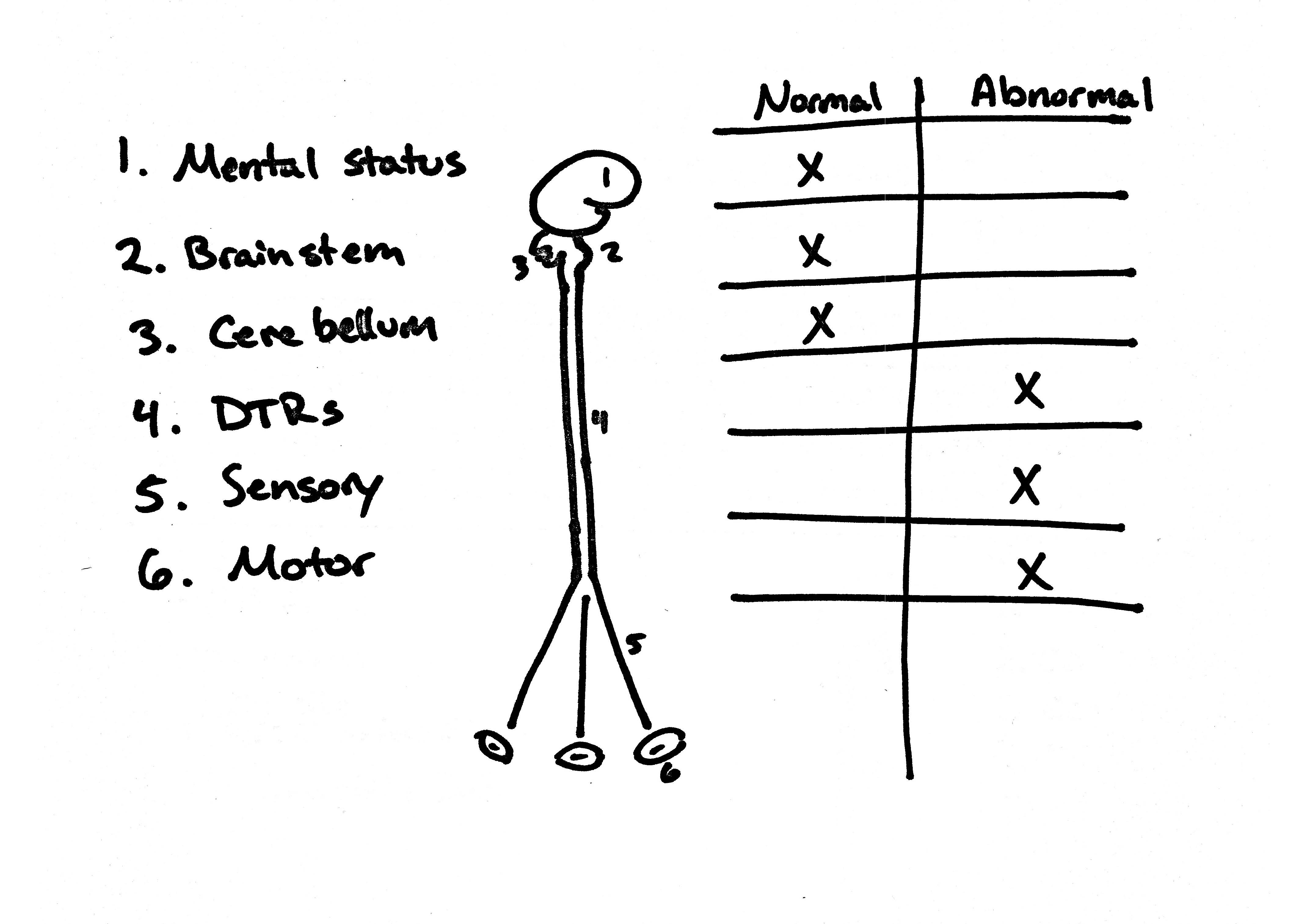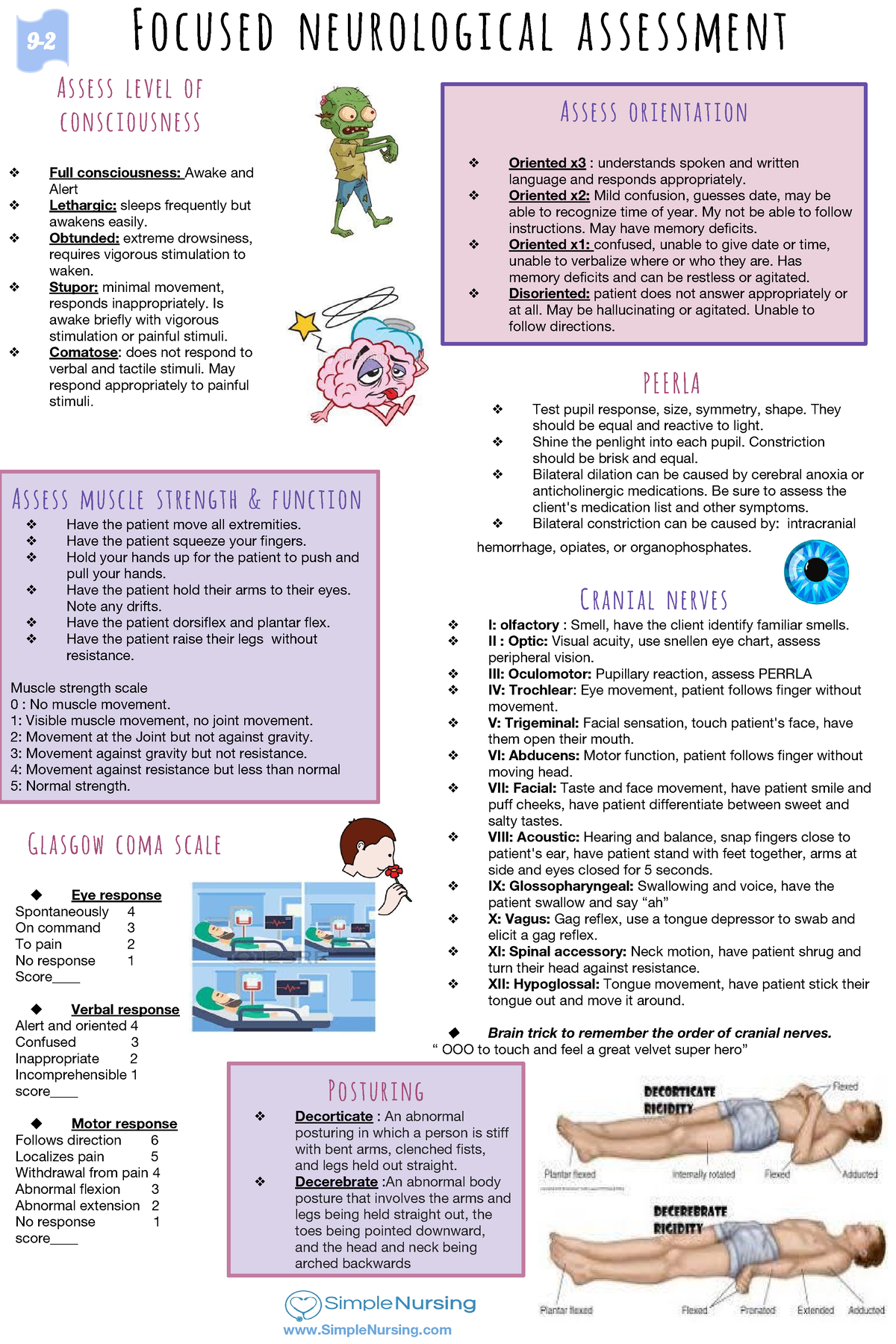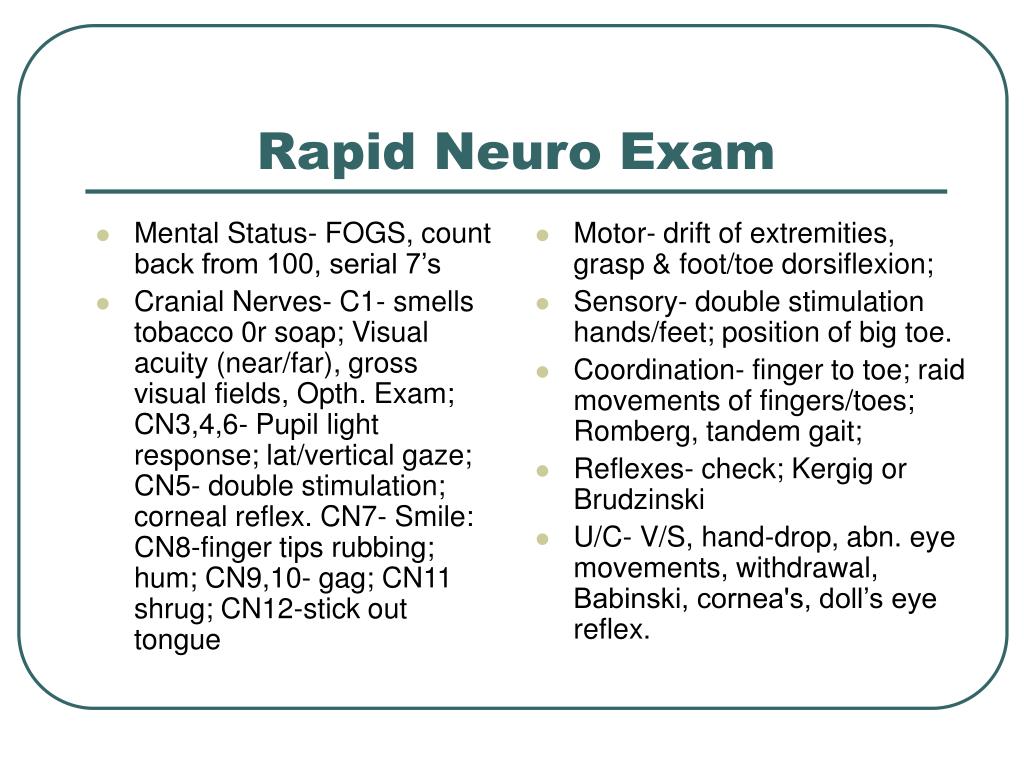Neuro Exam Cheat Sheet - A thorough assessment of cranial nerves helps identify neurological deficits and aids in diagnosing neurological conditions. Touch finger tip to nose with eyes open and: Comprehensive single system exam (neurological) with auscultation of either the carotid or the heart. This guide offers a comprehensive overview and a. The neurologic examination is typically divided into eight components: Examiner holds out his or her index fingers in the periphery of the patient’s vision, about 180o apart (e.g., above the patient’s right eye and below the patient’s left eye), and. Closed, observing accuracy and tremor. Run heel down shinbone towards knee and. We, neurologists, spend long time with patients so we use every opportunity.
We, neurologists, spend long time with patients so we use every opportunity. Touch finger tip to nose with eyes open and: A thorough assessment of cranial nerves helps identify neurological deficits and aids in diagnosing neurological conditions. Run heel down shinbone towards knee and. This guide offers a comprehensive overview and a. Comprehensive single system exam (neurological) with auscultation of either the carotid or the heart. The neurologic examination is typically divided into eight components: Closed, observing accuracy and tremor. Examiner holds out his or her index fingers in the periphery of the patient’s vision, about 180o apart (e.g., above the patient’s right eye and below the patient’s left eye), and.
Examiner holds out his or her index fingers in the periphery of the patient’s vision, about 180o apart (e.g., above the patient’s right eye and below the patient’s left eye), and. Run heel down shinbone towards knee and. We, neurologists, spend long time with patients so we use every opportunity. A thorough assessment of cranial nerves helps identify neurological deficits and aids in diagnosing neurological conditions. Closed, observing accuracy and tremor. Comprehensive single system exam (neurological) with auscultation of either the carotid or the heart. Touch finger tip to nose with eyes open and: This guide offers a comprehensive overview and a. The neurologic examination is typically divided into eight components:
Neurological Assessment Practical Cheat Sheet NEUROLOGICAL ASSESSMENT
We, neurologists, spend long time with patients so we use every opportunity. Touch finger tip to nose with eyes open and: Run heel down shinbone towards knee and. The neurologic examination is typically divided into eight components: Closed, observing accuracy and tremor.
Mohawk College RPN Student Resource Cranial Nerve Neuro Assessment
Run heel down shinbone towards knee and. Closed, observing accuracy and tremor. The neurologic examination is typically divided into eight components: We, neurologists, spend long time with patients so we use every opportunity. Comprehensive single system exam (neurological) with auscultation of either the carotid or the heart.
Pin on Nursing School
Examiner holds out his or her index fingers in the periphery of the patient’s vision, about 180o apart (e.g., above the patient’s right eye and below the patient’s left eye), and. The neurologic examination is typically divided into eight components: Closed, observing accuracy and tremor. We, neurologists, spend long time with patients so we use every opportunity. This guide offers.
How to master the neuro exam Scope
This guide offers a comprehensive overview and a. Examiner holds out his or her index fingers in the periphery of the patient’s vision, about 180o apart (e.g., above the patient’s right eye and below the patient’s left eye), and. We, neurologists, spend long time with patients so we use every opportunity. Closed, observing accuracy and tremor. Run heel down shinbone.
OSCE Cheat Sheet Sheet 1 Neurological Assessment State VITALS
Closed, observing accuracy and tremor. Comprehensive single system exam (neurological) with auscultation of either the carotid or the heart. We, neurologists, spend long time with patients so we use every opportunity. Touch finger tip to nose with eyes open and: The neurologic examination is typically divided into eight components:
Cultural adaptation and reliability assessment of the Hammersmith
The neurologic examination is typically divided into eight components: Touch finger tip to nose with eyes open and: Examiner holds out his or her index fingers in the periphery of the patient’s vision, about 180o apart (e.g., above the patient’s right eye and below the patient’s left eye), and. Comprehensive single system exam (neurological) with auscultation of either the carotid.
Focused Neurological Assessment Focused neurological assessment
Run heel down shinbone towards knee and. The neurologic examination is typically divided into eight components: A thorough assessment of cranial nerves helps identify neurological deficits and aids in diagnosing neurological conditions. This guide offers a comprehensive overview and a. Closed, observing accuracy and tremor.
Neurologic Examination Neurological assessment, Diagnostic imaging
A thorough assessment of cranial nerves helps identify neurological deficits and aids in diagnosing neurological conditions. Comprehensive single system exam (neurological) with auscultation of either the carotid or the heart. Touch finger tip to nose with eyes open and: We, neurologists, spend long time with patients so we use every opportunity. Examiner holds out his or her index fingers in.
Neuro Exam Template
Touch finger tip to nose with eyes open and: This guide offers a comprehensive overview and a. Closed, observing accuracy and tremor. Examiner holds out his or her index fingers in the periphery of the patient’s vision, about 180o apart (e.g., above the patient’s right eye and below the patient’s left eye), and. Comprehensive single system exam (neurological) with auscultation.
The Neurologic Examination Is Typically Divided Into Eight Components:
Comprehensive single system exam (neurological) with auscultation of either the carotid or the heart. Closed, observing accuracy and tremor. Examiner holds out his or her index fingers in the periphery of the patient’s vision, about 180o apart (e.g., above the patient’s right eye and below the patient’s left eye), and. A thorough assessment of cranial nerves helps identify neurological deficits and aids in diagnosing neurological conditions.
This Guide Offers A Comprehensive Overview And A.
Touch finger tip to nose with eyes open and: We, neurologists, spend long time with patients so we use every opportunity. Run heel down shinbone towards knee and.









